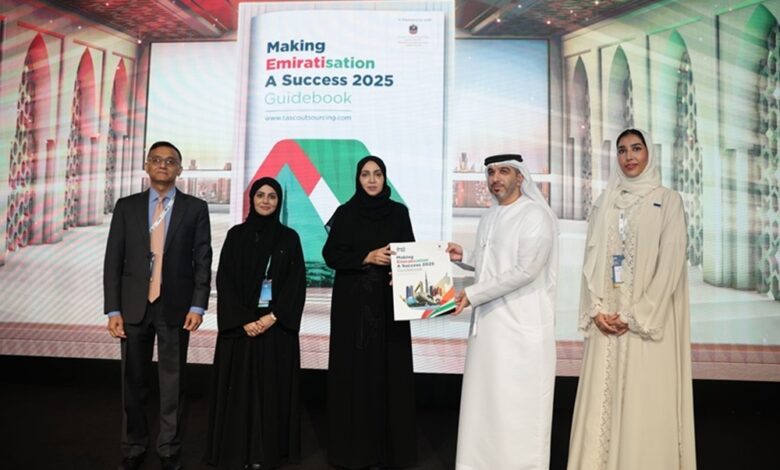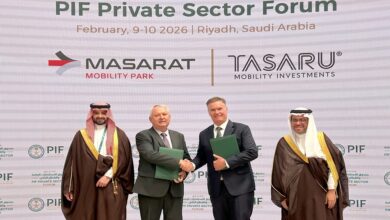
New TASC Outsourcing and MoHRE survey reveals key trends and insightful data to help actualise Emiratisation in 2025
Key Highlights:
- Despite global shifts towards flexible working models, over 53% of Emirati job seekers continue to work in fully onsite roles.
- 52.39% of employers acknowledge facing retention challenges, and an additional 25.60% perceive these challenges as highly significant, primarily due to discrepancies in compensation packages and market realities.
- 50% of Emirati respondents possess basic AI-related skills, the survey highlights a notable gap in advanced areas such as machine learning, natural language processing, and robotics.
In a country where ambition meets opportunity, the UAE continues to champion the empowerment of its people. With a bold vision to shape a future-ready workforce, TASC Outsourcing, MENA’s leading workforce solutions provider, has once again joined forces with the Ministry of Human Resources and Emiratisation (MoHRE) to launch the 3rd edition of their flagship guidebook, “Making Emiratisation a Success – 2025.” This latest edition sheds light on the nation’s impressive strides in driving meaningful employment for Emiratis and shaping a more inclusive, resilient labour market.
According to the survey, by the end of 2024, there was a record-breaking growth of 131,883 Emirati employees in the private sector, reflecting the success of targeted Emiratisation initiatives. This achievement was made possible through strong public-private sector collaboration and underscores the collective commitment to building a diverse and inclusive national workforce.
The present employment scenario for Emirati talent shows some encouraging characteristics alongside substantial challenges. Nearly half (49.13%) of the Emirati job seekers are willing to begin working within 30 days, and 82.97% express confidence in their skills for private-sector positions, suggesting a strong and assertive talent pool availability in the UAE market. Employers appear aligned with this momentum, as 63.40% continue to prioritise permanent contracts, reinforcing long-term Emiratisation goals. While job satisfaction among Emiratis stays around 57%, 74% of respondents express dissatisfaction with salaries, highlighting compensation as a key area for improvement. The shared emphasis on stability, by both employers and Emirati candidates, continues to shape hiring practices across sectors.
On-site work prevails, with more than half (53%) of Emirati employees fully onsite, and limited access to hybrid or remote options, highlighting the need for flexibility and talent retention, especially for women and young parents. Salary disparities, cultural imbalance, and appealing public-sector options also drive high attrition rates, with 52.39% of companies battling retention.
Speaking of the need for Emiratisation initiatives, Mahesh Shahdadpuri, Founder and CEO of TASC Outsourcing, stated, “Effective Emiratisation requires precise alignment between employer offerings and Emirati talent expectations. Our data-driven guidebook underscores essential strategies such as increased workplace flexibility, tailored compensation structures, and targeted skill development programmes, particularly in AI and emerging technologies. As Emiratisation continues evolving, our commitment remains firm—to support private-sector employers in creating sustainable, meaningful roles for UAE nationals.”
The Emiratisation Guidebook 2025 offers essential data and strategic insights to enhance Emirati employee retention, promote workplace flexibility, and better align with private-sector needs. Its survey, which gathered perspectives from 2,000 Emirati job seekers and employees and 450 private-sector employers, provides valuable insights to support these objectives.
Emirati citizens are increasingly looking for positions in technology-centric industries, reflecting the UAE’s strategic emphasis on technological innovation and digital transformation. In particular, preference for the information and communication sector has grown significantly from 4.12% in 2024 to 15.84% this year, with continued interest in the public and social sector (33.95%). For employers, Operations (46.17%), HR & Admin (45.69%), and Sales & Marketing (44.06%) remain the top hiring categories. With 23.98% of Emirati job seekers indicating a definitive shift toward digital and tech-driven roles, the IT sector has emerged as the top employment choice among Emirati job seekers. While 52.26% have a basic understanding of AI, there is a great opportunity for upskilling in AI knowledge, especially in advanced areas such as machine learning.
HE Farida Abdulla Al Ali, Assistant Undersecretary of National Talents, MoHRE, emphasised, “The UAE government remains unwavering in its commitment to accelerating Emiratisation, anchored by transformative initiatives such as Nafis and robust policy frameworks that establish measurable, sector-specific hiring targets. Through stringent compliance protocols and proactive oversight, we are ensuring that Emirati talent is seamlessly and sustainably integrated into the private sector workforce. Our partnership with TASC amplifies this national mission—enabling employers to meaningfully contribute to Emiratisation objectives through various initiatives.”
Workforce capabilities are further strengthened by supporting AI upskilling initiatives, such as those supported by MoHRE and Nafis. By increasing employer engagement, making the most of the Falak Tayyeb app for job searches may enhance hiring effectiveness and cultural fit. Furthermore, keeping up with Emiratisation regulations and examining incentive schemes, like wage support plans for recent graduates, can help guarantee adherence and promote the integration of diverse talent.





